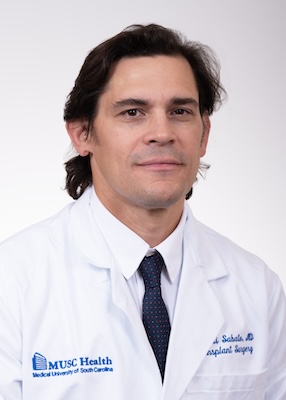
Prabhakar Baliga, M.D.
- Transplant Surgery
- Charleston, SC

Listen to husband & father of three, Jason Flores, as he shares his story about finding a living donor & receiving a kidney transplant.
For thousands of people waiting for a transplant in the United States, a living donor could be a lifesaver. A living donor is a live person who chooses to donate an organ or part of an organ to transplant into another person. Recipients experience many benefits when they receive a kidney from a living donor, such as a shorter waiting period, fewer complications, and excellent outcomes.
MUSC Health experts perform living-donor transplant surgery for kidney transplants. A dedicated living donor team manages all living donors. They are here to help guide you through the process.
There are more than 90,000 people on the national waiting list for a kidney transplant, and they will be waiting an average of three to five years. The number of kidneys available from deceased donors isn’t enough to meet this demand, and thousands of people die each year waiting for an organ to become available.
There is another way, however. Living kidney donation is a great option for qualified donors and recipients. In fact, donating a kidney to a family member, friend, co-worker or even a stranger is often the best way to provide the lifesaving treatment they need.
MUSC Health’s Living Donor program has been in place for more than 30 years. We’re ready to help you give the ultimate gift – the gift of life.
We are here to support and guide you each step of the way. To speak with a member of the Living Donor Program team call 843-792-5097.
Living donation is the process by which a living donor chooses to have a surgeon remove one of their kidneys and transplant it into a waiting recipient. Living donor kidneys are usually much higher quality than kidneys from deceased donors. They are the gold standard in kidney transplant surgery.
If you are currently waiting for a kidney transplant, a donation could be your key to achieving greater health. Compared to kidneys received from deceased donors:
If you’re interested in donating a kidney, there are several things to keep in mind. First, the entire process is completely elective. In fact, you’ll need to contact one of our Living Donor Program coordinators to get started. There is absolutely no pressure on you to begin or complete the process.
Once you’ve expressed interest in donating an organ, you’ll need to provide a personal and family medical history. If we determine you’re a suitable donor candidate, you’ll undergo several initial screening tests, including blood, urine, and blood pressure analysis.
If these results are satisfactory, your program coordinator will help you schedule the remaining evaluation and testing, which is typically a two-day process.
Once we confirm you’re a suitable donor, we schedule your donation on a date that’s most convenient for you.
Kidney donation surgery is a robotic procedure. This minimally invasive laparoscopic surgical method reduces scarring and pain. Because of MUSC Health’s expertise in living kidney donation, kidney donors are usually able to return home quickly, often within one to two days.
Living kidney donors are in good general health with no obvious signs of kidney disease.
The National Kidney Donor Registry is a national program to match up incompatible pairs of kidney donors and recipients.
These are well tolerated procedures with minimal overall risk and less than a 1% risk of serious surgical complications.
The length of stay in the hospital is on average 1 day and people usually take approximately 2-3 weeks at home to recover fully.
There are usually 3 small scars as this is done with laparoscopic instruments.
Potential living kidney donors are typically between the ages of 18 and 75.
You can truly change someone’s life through living donation. If you’re interested in learning more or beginning the process of organ donation, please contact MUSC Health’s Living Donor Program at 843-792-5097 or register as a liver donor.
